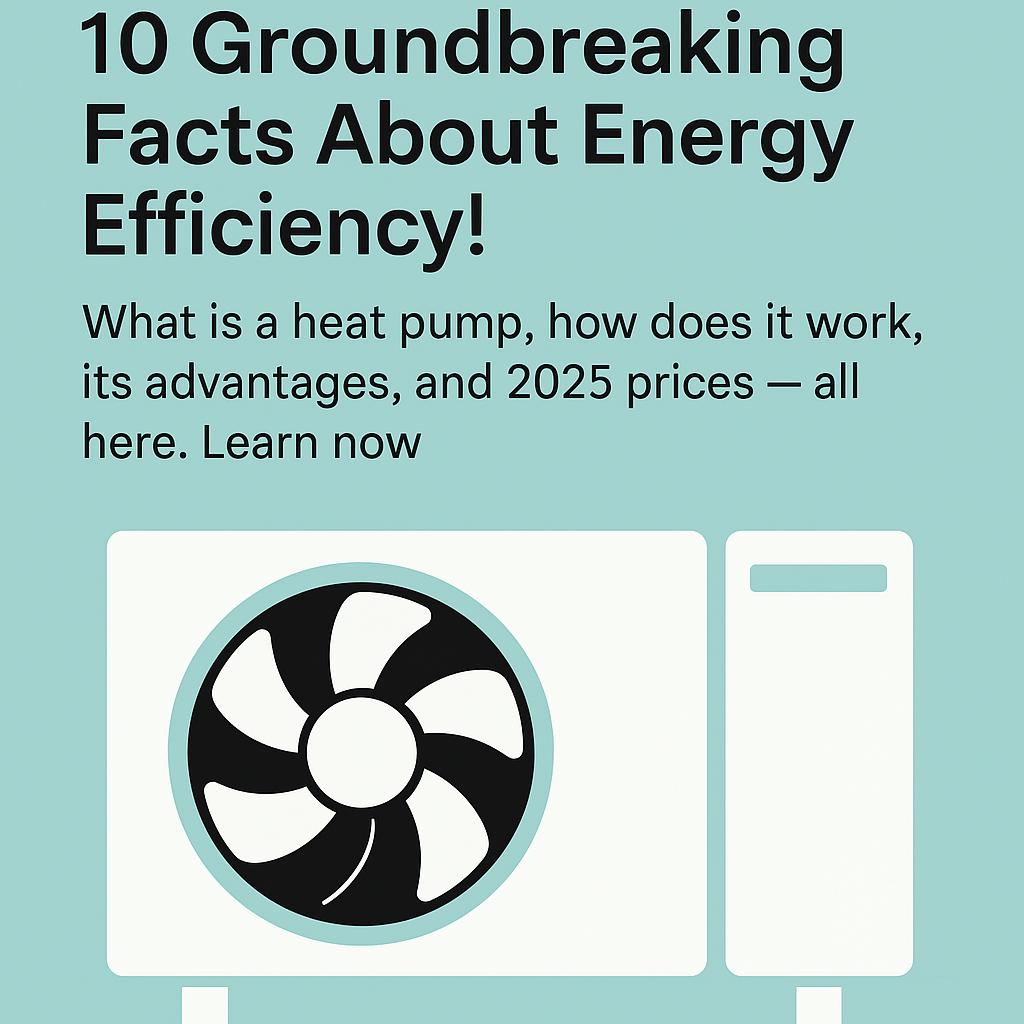What is a Heat Pump?

What is a Heat Pump?
How Does a Heat Pump Work?
A heat pump is an innovative device that provides heating or cooling by transferring heat from one environment to another. Its working principle is based on directly using heat from nature.
In short, it uses electrical energy solely for heat transfer, keeping consumption to a minimum. It works like an air conditioner but not only cools; it also heats during the winter.
Heat pump systems consist of basic components such as an evaporator, compressor, condenser, and expansion valve. They are highly efficient in terms of energy performance.
History of the Heat Pump
The basic principles of heat pumps were discovered in the mid-19th century. The first commercial heat pumps were introduced in the 1940s.
Since then, technology has advanced significantly, leading to today's modern, quiet, and highly efficient devices.
Types of Heat Pumps
Air Source Heat Pump
The most commonly used type. It utilizes heat from the outdoor air to heat or cool indoor spaces. It is easy to install and cost-effective.
Water Source Heat Pump
It extracts energy from seas, lakes, or underground water sources. It offers high efficiency but requires proximity to a water source.
Ground Source (Geothermal) Heat Pump
It benefits from the stable temperature a few meters below the ground. Although it has a high initial investment cost, it provides significant savings in the long term.
Advantages of Heat Pumps
Energy Savings
Heat pumps can produce 3 to 5 units of heat energy for every unit of electricity consumed. Thanks to this feature, they offer up to 50% energy savings compared to conventional heating systems, resulting in significant reductions in energy bills over time.
Eco-Friendly Usage
Heat pumps help protect the environment by reducing carbon emissions. They minimize fossil fuel consumption and can operate efficiently with renewable energy sources, contributing to a sustainable lifestyle.
Low Operating Costs
Although the initial investment is high, maintenance and operating expenses are low. Apart from annual maintenance, they incur minimal costs, making total ownership costs very attractive in the long run.
Disadvantages of Heat Pumps
High Initial Cost
Heat pump systems have a higher installation cost compared to traditional heating systems. However, this cost can be amortized within a few years thanks to the savings they provide.
Decreased Performance in Cold Climates
In very low temperatures, the efficiency of air source heat pumps can decrease. In such cases, hybrid systems (heat pump + auxiliary heater) are recommended.
Differences Between Heat Pumps and Traditional Heating Systems
Comparison with Natural Gas Heating
-
Cost: Natural gas systems are cheaper initially, but heat pumps are more economical in long-term use.
-
Environmental Impact: Heat pumps reduce carbon footprint.
-
Maintenance: Natural gas systems require regular chimney and safety inspections, while heat pump maintenance is easier.
Comparison with Electric Heaters
-
Efficiency: Heat pumps are much more efficient than electric heaters.
-
Bill Impact: Electric heaters consume direct electricity and increase bills, whereas heat pumps have lower consumption.
Things to Consider When Choosing a Heat Pump
Home Size and Insulation
The capacity of the heat pump should be determined based on the size of the home and the quality of insulation. Otherwise, efficiency losses and shortened device lifespan may occur.
Regional Climate Conditions
In very cold areas, ground source or hybrid systems are preferable. In mild climates, air source pumps are sufficient.
Device Efficiency Class (COP and SCOP Values)
-
COP: Instantaneous efficiency value of the heat pump.
-
SCOP: Seasonal efficiency value. Products with high COP and SCOP values should be preferred.
Heat Pump Installation and Setup
Choosing an Expert
Installing a heat pump requires expertise. Working with experienced and authorized services increases the lifespan and efficiency of the device.
Step-by-Step Installation Process
-
Site survey is conducted.
-
Capacity calculation is performed.
-
Indoor and outdoor units are installed.
-
Piping and electrical connections are completed.
-
The system is tested and handed over to the user.
Common Mistakes in Heat Pump Usage
Choosing the Wrong Capacity
Selecting a device that is too small or too large for the home’s needs leads to inefficiency.
Insufficient Maintenance
Failing to regularly clean filters and the outdoor unit causes performance loss.
Heat Pump Maintenance and Service Tips
Regular Filter Cleaning
Filters collect dust from the air and should be cleaned every 2–3 months.
Professional Annual Maintenance
A general maintenance check should be performed annually by an authorized service to extend the device’s life and maintain efficiency.
Heat Pump Prices in 2025
Factors Affecting the Price
-
Brand and model
-
Heating-cooling capacity
-
Installation complexity
-
Additional features (smart control, inverter technology, etc.)
Average Price Range
As of 2025 in Turkey, heat pump prices, including installation, range from approximately 150,000 TL to 400,000 TL.
Government Incentives and Support for Heat Pumps
Incentive Programs in Turkey in 2025
The Ministry of Energy and some municipalities offer grants and credit support of up to 20% for heat pump systems.
How to Benefit from Incentives?
-
Submit an application form
-
Provide invoice and installation documents
-
Meet specific energy efficiency standards
(? Click here for Official Incentive Information!)
Frequently Asked Questions (FAQ)
Does a heat pump work in the cold?
Yes, but performance may drop in extremely cold areas. Therefore, auxiliary heating is recommended.
Heat pump or boiler?
For long-term energy savings, a heat pump is more advantageous. However, a boiler offers a lower initial installation cost.
What is the electricity consumption of a heat pump?
It is quite low. The ratio of heat energy produced to electricity consumed (COP) is high.
Is heat pump maintenance difficult?
No. Only regular filter cleaning and annual professional maintenance are required.
Where should the outdoor unit of the heat pump be installed?
It should be installed in a location with free airflow, protected from direct sunlight and strong winds.
Can a heat pump be used in summer?
Yes! Heat pumps provide both heating and cooling and can function as an air conditioner during the summer.
Conclusion: Is Investing in a Heat Pump Worth It?
A heat pump is a valuable investment that benefits both your wallet and the environment in the long term. Although the initial cost is high, the energy savings, low maintenance costs, and eco-friendly features make it absolutely worthwhile.
Especially in today's world where energy prices are constantly rising, switching to heat pump technology is a smart move.
